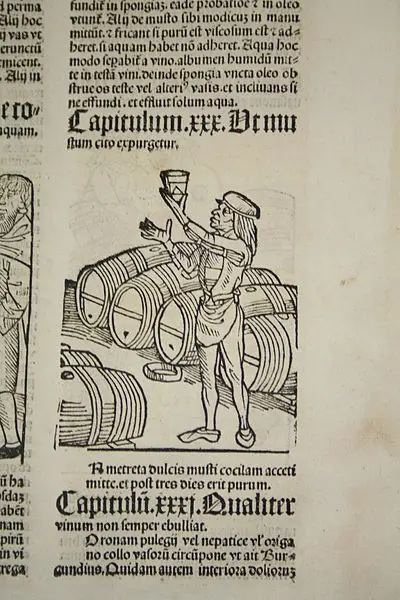
Thanks to a question from Tudor Society member Sharon I have been digging into what Eustace Chapuys, the imperial ambassador, said about Henry VIII's serious jousting accident in January 1536.
In his report of the accident, Chapuys wrote:
"On the eve of the Conversion of St. Paul, the King being mounted on a great horse to run at the lists, both fell so heavily that every one thought it a miracle he was not killed, but he sustained no injury. Thinks he might ask of fortune for what greater misfortune he is reserved, like the other tyrant who escaped from the fall of the house, in which all the rest were smothered, and soon after died."1
Sharon asked me whether I knew who Chapuys was referring to when he said "the other tyrant who escaped from the fall of the house, in which all the rest were smothered, and soon after died", and I must admit that I had always been perplexed by this reference, so I got researching.
I came across the story of Theramenes. Theramenes was a leading member of the ogligarchy known as "The Thirty Tyrants of Athens" who came to power in 404 BCE after the Peloponnesian War. In The Works of Jeremy Taylor, Taylor writes that Theramenes escaped "when his house fell on him, and was shortly put to death with torments by his colleagues in the tyranny."2 ÆLIAN’s Various History says:
"It happened that as soon as Theramenes came out of an House, that House fell down immediately: The Athenians flocked to him from every side to congratulate his escape; but he contrary to all their expectations, said, "O Jupiter, to what opportunity do you reserve me?" And not long after he was put to death by the Thirty Tyrants, drinking Hemlock."3
Now my knowledge of Greek history is not very good so I looked up the Thirty Tyrants and found the following information:
The Encyclopaedia Britannica:
"Thirty Tyrants, (404–403 bc) Spartan-imposed oligarchy that ruled Athens after the Peloponnesian War. Thirty commissioners were appointed to the oligarchy, which had an extremist conservative core, led by Critias. Their oppressive regime fostered a bloody purge, in which perhaps 1,500 residents were killed. Many moderates fled the city; gathering a force, they returned to defeat the tyrants’ forces in a battle at Piraeus in 403. The 30 fled and were killed off over the next few years."4
Harpers Dictionary of Classical Antiquities (1898) says:
"Thirty Tyrants - The name usually given to the committee of thirty aristocrats who at the close of the Peloponnesian War (B.C. 404), and under the protection of the victorious Spartans, undertook the administration of the Athenian government. The chiefs of this body were Critias and Theramenes. They secured a new Senate, put to death their chief political opponents, and installed a Spartan garrison in the Acropolis. A reign of terror ensued which led to a reaction; and presently a body of exiled citizens headed by Thrasybulus marched upon Athens, defeated the troops of the Thirty, and slew Critias. After some delay the Spartan government recognized the status quo and thus permitted the resumption of a democratic government (B.C. 403)."5
I believe that Chapuys must have been referring to Theramenes because in Aelian's book it says that Theramenes asked "O Jupiter, to what opportunity do you reserve me?" and Chapuys said of Henry VIII "Thinks he might ask of fortune for what greater misfortune he is reserved". Is Chapuys comparing Henry VIII to the tyrannical Theramenes? Is he saying that Henry VIII is a tyrant who escaped this brush with death because Fortune has something worse in store for him? Is he comparing Henry VIII's reign with the reign of terror of the Thirty Tyrants? Yes, I believe so.
What do you think?
Notes and Sources
- LP x.200, Chapuys to Granvelle
- The Works of Jeremy Taylor, Volume 5, ed. Rev. T.S. Hughes, 1831 - see https://books.google.es/books?id=H0oQAAAAYAAJ&printsec=frontcover#v=onepage&q&f=false, p150.
- ÆLIAN’s Various History, Book 9, Chapter 21 - see http://penelope.uchicago.edu/aelian/varhist9.xhtml
- Encyclopaedia Britannica - http://www.britannica.com/EBchecked/topic/592610/Thirty-Tyrants
- Harpers Dictionary of Classical Antiquities (1898) - http://www.perseus.tufts.edu/hopper/text?doc=Perseus:text:1999.04.0062:id=thirty-tyrants-harpers



Oh wow! The erudite Chapuys…mourning the death of Catherine. believing her poisoned, fearing for Mary and longing to be avenged! Just goes to show where you can still get by asking questions. Thanks Claire. Oh well done you!
Thank you Claire. That satement has always bothered me, and I’m so glad I asked about it. You are a wonder!
Wow, fascinating! Gives a whole new meaning to what Chapuys wrote. Great job Claire, this is why your’s is one of my favorite websites.
Points well taken. Mystery solved!